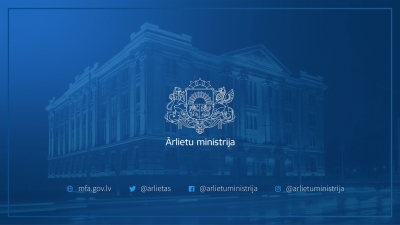Upon accession to the European Union (EU) in 2004, Latvia has become a donor country instead of a beneficiary, and delivers on its international commitments to promoting global development and providing support to developing countries. Latvia’s development cooperation is built on the global development agenda and agreements: the United Nations (UN) 2030 Agenda for Sustainable Development (the 2030 Agenda), which sets 17 Sustainable Development Goals (SDGs); the European Consensus on Development, "Our World, Our Dignity, Our Future"; the Addis Ababa Action Agenda on financing for development; and the Paris Agreement to the United Nations Framework Convention on Climate Change.
In view of the geographical and thematic priorities of Latvia’s development cooperation, other EU policy planning documents and conclusions of the Council of the EU are also taken into account in the formulation and implementation of development cooperation policy, including EU external action and neighbourhood policy strategies, the new EU Strategy for Central Asia and the conclusions of the Council of the EU on the future of the EU Eastern Partnership after 2020. In order to improve the quality and efficiency of development cooperation in Latvia, policy planning and implementation is also based on recommendations, guidelines and good practice of the OECD Development Cooperation Committee (hereinafter – DAC).
The objectives, courses of action and tasks of development policy pursued by Latvia are set out in the Development Cooperation Policy Guidelines for 2021–2027 (hereinafter – Guidelines). With these guidelines, Latvia reaffirms its commitment to contributing to a sustainable and democratic development of the world and of partner countries and to addressing global challenges. The guidelines take forward the evolution of Latvia’s development cooperation policy and system for more than 15 years.
In its development cooperation policy, Latvia highlights the importance of joint work and partnerships at all stages, both within the framework of the Latvian development cooperation community and in relations with partner countries and other implementers of development cooperation, especially within the framework of the European Union. Latvia supports cross-sectoral cooperation and partnership in development cooperation, emphasizing the role and added value of various stakeholders – public administration, local governments, civil society, academic institutions, the private sector and their experts – in development cooperation. Latvia is also open to cooperation with other donors in the implementation of development cooperation, especially in regions where the involvement of Latvia has been lower.
Taking into account the needs of partner countries, the cooperation directions set at the European Union level and the comparative experience and expertise of Latvia, Latvia will continue to provide support to partner countries through implementing development cooperation in the areas of the promotion of the rule of law, development of, and capacity building among public administration, business development, gender equality, promotion of democratic participation and development of civil society, education, as well as climate change and environmental protection, thereby contributing to the implementation of Agenda 2030. In implementing its thematic priorities, Latvia also focuses on digitalisation as the driver of development and supports innovative and proven digital solutions that can contribute to the efficiency of national administration, public participation in decision-making and the creation of new economic opportunities in partner countries.
According to the Guidelines, the geographical priorities of Latvia’s development cooperation are the EU Eastern Partnership countries (in particular, Georgia, Moldova, Ukraine, as well as Belarus) and Central Asian countries (in particular, Kyrgyzstan, Tajikistan and Uzbekistan). In addition, with the financing allocated for the implementation of the development cooperation policy increasing, it is for the first time that Latvia has defined the provision of aid to other regions (African countries in particular) as a priority, thereby contributing to global public benefits and addressing global challenges, and also complying with the official development aid commitments of Latvia to also support the least developed countries.
Pursuant to the Guidelines, Latvia undertakes to continue increasing the official development assistance (the ODA) to at least 0.23 % from its gross national income over the period from 2021 to 2027.
A model for an increase in allocations was approved by the Concept Report on Increasing Financing for Development Cooperation in 2021–2025.
A Development Cooperation Policy Plan for 2024–2027 (hereinafter – Plan) has been developed to achieve the objectives set out for Latvia’s development co-operation in the Guidelines.
The Plan includes specific measures to achieve the development cooperation policy objective of “to promote sustainable development and eradication of poverty, the rule of law and good governance in developing countries, in particular, the priority partner countries of Latvia by contributing to the implementation of the 2030 Agenda” through implementing development cooperation in the field of promotion of the rule of law, development and capacity building of public administration, business development, gender equality, facilitating democratic participation and development of civil society, education, as well as climate change and environmental protection.




